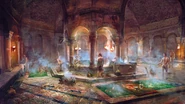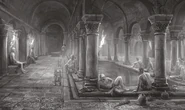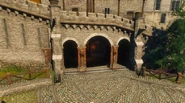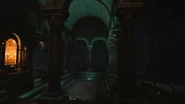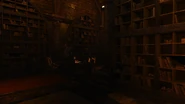mNo edit summary Tag: Visual edit |
m (clean up) |
||
| Line 4: | Line 4: | ||
'''Sigismund's Bathhouse''' is south of [[St. Gregory's Bridge]], in the [[Gildorf]] district of [[Novigrad]], is one of the prominent places during {{Tw3}}. This large bathhouse is run by one-time spy and now Big Four crime lord, [[Sigismund Dijkstra]], and his eunuch, [[Happen the Eunuch|Happen]]. It also has an entrance to the[[Novigrad sewers| sewers]] system. |
'''Sigismund's Bathhouse''' is south of [[St. Gregory's Bridge]], in the [[Gildorf]] district of [[Novigrad]], is one of the prominent places during {{Tw3}}. This large bathhouse is run by one-time spy and now Big Four crime lord, [[Sigismund Dijkstra]], and his eunuch, [[Happen the Eunuch|Happen]]. It also has an entrance to the[[Novigrad sewers| sewers]] system. |
||
| − | == Notable |
+ | == Notable people == |
* [[Sigismund Dijkstra|Sigi Reuven]] |
* [[Sigismund Dijkstra|Sigi Reuven]] |
||
* [[Happen the Eunuch]] |
* [[Happen the Eunuch]] |
||
Revision as of 03:37, 7 August 2018
| The city's public bathhouse plays an important social role in addition to its hygienic functions. This is a place where city dwellers come to relax, merchants come to discuss investments, and the heads of the criminal underworld come to plan their murky dealings.
Stone interiors, columns, arched vaults, tanks with warm and cold water—all these elements drew initial inspiration from the classical thermae of ancient Rome. Our artists then tried to endow them with a unique look that would fit into the realities of the world we had created. |
|||
| - The Witcher 3: Wild Hunt Artbook | |||
Sigismund's Bathhouse is south of St. Gregory's Bridge, in the Gildorf district of Novigrad, is one of the prominent places during The Witcher 3: Wild Hunt. This large bathhouse is run by one-time spy and now Big Four crime lord, Sigismund Dijkstra, and his eunuch, Happen. It also has an entrance to the sewers system.
Notable people
Associated quests
Trivia
- Stone interiors, columns, arched vaults, tanks with warm and cold water—all these elements drew initial inspiration from the classical thermae of ancient Rome.[1]


